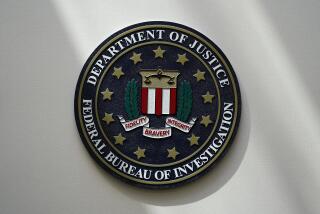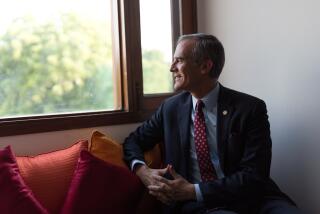U.S. Somalia Envoy ‘a Natural in a Crisis’ : Diplomacy: Oakley has spent the past decade salvaging foreign debacles.
- Share via
WASHINGTON — For Ambassador Robert B. Oakley, a colleague mused, the crisis in Somalia was almost made to order. Widely known around Washington as the diplomat’s diplomat, the man named chief U.S. envoy to Somalia has spent the past decade salvaging assorted foreign policy debacles or crises.
Those experiences, friends and colleagues say, make him uniquely capable of taking on the thorny problems in the nation racked by clan wars and famine.
“Bob is really a driven person. He’s a pit bull when it comes to getting the job done. As tough as the Somali situation is, he is one of the few people who has a chance of making it work,” declared Chester A. Crocker, former assistant secretary of state for African affairs during the Ronald Reagan Administration and a longtime Oakley colleague and friend. “He also wasn’t born yesterday. He knows that in this part of the world, you count your fingers both before and after each handshake, but you do it with great humility and humanity.”
The new posting brings Oakley, 61, full circle. He returns to Somalia having completed the string of tough emergency assignments that followed his last job there, as U.S. ambassador between 1982 and 1984.
After the wave of hostage seizures and suicide car bombings of American diplomatic and military personnel in the Middle East in the early 1980s, Oakley helped establish and expand the State Department’s new Counterterrorism Office in 1984. He helped develop the tough law-and-order approach that subsequently was enacted in the first U.S. anti-terrorism legislation.
The Reagan White House made Oakley staff director of Middle East and South Asian affairs on the National Security Council--a job that he had also held in the Gerald R. Ford Administration--after the embarrassing disclosures on the arms-for-hostages swap with Iran in 1986. He is widely credited with orchestrating the American naval deployment in the Persian Gulf to protect Kuwaiti oil tankers during the Iran-Iraq War.
After U.S. Ambassador to Pakistan Arnold L. Raphel was killed with Pakistani President Zia ul-Haq in a mysterious 1988 plane crash, Oakley was dispatched to Islamabad as chief American envoy. His stint there coincided with the restoration of democracy after 11 years of military rule, as well as development of a tough new U.S. policy on aid to Pakistan in reaction to that nation’s nuclear program.
Even before the White House announced plans to send U.S. troops to Somalia, Oakley had been consulted and then commissioned to lead the political side of the mission.
“He knows all the ropes and all the major players,” said a White House official. “He’s also a natural in a crisis.”
Oakley is a close friend of Mohammed Sahnoun, who served as U.N. special envoy to Somalia until recently. “Bob is just the right appointment,” Sahnoun said in an interview. “He has a remarkable way of getting along with the toughest people and he’s able to persuade them because he’s patient and fair.”
He immediately helped bring together the country’s two major warlords, Mohammed Farah Aidid and Ali Mahdi Mohamed, in crucial peace talks last Friday. U.S. officials said they expect his actions to pave the way for what happens in Somalia after U.S. troops leave.
“It’s a little like the Arab-Israeli peace process,” said one of Oakley’s colleagues. “The Somalis have to want real peace to make any outside effort work. Bob’s making clear that the United States will help them work out their differences--but that Washington is not ultimately responsible for either making or keeping the peace.”
More to Read
Sign up for Essential California
The most important California stories and recommendations in your inbox every morning.
You may occasionally receive promotional content from the Los Angeles Times.










